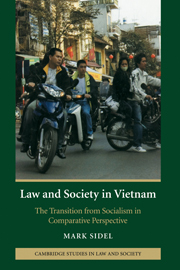Book contents
- Frontmatter
- Contents
- List of tables
- Acknowledgements
- Introduction
- Chapter 1 Constitutionalism and the emergence of constitutional dialogue in Vietnam
- Chapter 2 The emerging debate over constitutional review and enforcement in Vietnam
- Chapter 3 Motorbike constitutionalism: The emergence of constitutional claims in Vietnam
- Chapter 4 Economic law in the service of globalization: Labor law and labor export from Vietnam
- Chapter 5 Law, the press, and police murder: The trial of Lt. Nguyen Tung Duong
- Chapter 6 Law and the regulation of civil society: Nonprofit organizations, philanthropy, grassroots organizations, and the state
- Chapter 7 Testing the limits of advocacy: The emergence of public interest law in Vietnam
- Chapter 8 Donors, law and social justice in Vietnam: The uncertain promise
- Bibliography
- Index
Chapter 3 - Motorbike constitutionalism: The emergence of constitutional claims in Vietnam
Published online by Cambridge University Press: 07 July 2009
- Frontmatter
- Contents
- List of tables
- Acknowledgements
- Introduction
- Chapter 1 Constitutionalism and the emergence of constitutional dialogue in Vietnam
- Chapter 2 The emerging debate over constitutional review and enforcement in Vietnam
- Chapter 3 Motorbike constitutionalism: The emergence of constitutional claims in Vietnam
- Chapter 4 Economic law in the service of globalization: Labor law and labor export from Vietnam
- Chapter 5 Law, the press, and police murder: The trial of Lt. Nguyen Tung Duong
- Chapter 6 Law and the regulation of civil society: Nonprofit organizations, philanthropy, grassroots organizations, and the state
- Chapter 7 Testing the limits of advocacy: The emergence of public interest law in Vietnam
- Chapter 8 Donors, law and social justice in Vietnam: The uncertain promise
- Bibliography
- Index
Summary
By the fall of 2005, Hanoi's motorcycle owners and riders were up in arms. Beginning two years earlier, in 2003, the Hanoi traffic police and the national police had promulgated a series of regulations that, they firmly believed, limited their autonomy and independence in owning, registering and riding motorbikes. First, in early 2003, the national police had announced a new national regulation stipulating that each Vietnamese citizen could legally register only one motorcycle, in an attempt to deal with rapidly increasing motorcycle congestion, accidents, deaths and pollution. Then Hanoi had enforced that national “one person, one motorbike” rule through a local regulation, angering Hanoi residents.
In early 2004, the Hanoi police sought other means to relieve motorcycle congestion, accidents and pollution in Hanoi. Concerned that the “one person, one motorbike” rule was difficult to enforce and that motorbikes were continuing to proliferate, the Hanoi authorities “temporarily suspended” new registrations of motorcycles in four of Hanoi's most congested urban districts. In early 2005, Hanoi extended that temporary suspension of registration from four to seven of Hanoi's districts. Hanoians were infuriated at both moves. The results were clear: “foreign” motorbikes – those registered in provinces outside Hanoi – were flooding into the city and dampening the resale value of motorbikes purchased but unable to be registered by Hanoi residents. And at US$3,000–8,000 per bike, Hanoians paid close attention to their motorcycle futures.
- Type
- Chapter
- Information
- Law and Society in VietnamThe Transition from Socialism in Comparative Perspective, pp. 74 - 91Publisher: Cambridge University PressPrint publication year: 2008



